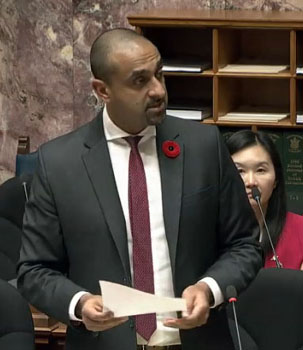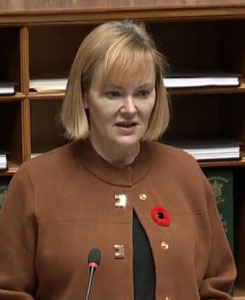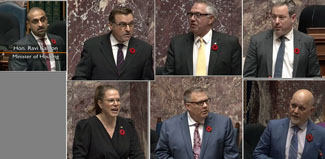
Thursday November 9,2023 | VICTORIA, BC [Updated 6:25 pm]
Editorial analysis by Mary P Brooke | Island Social Trends
Earlier this week Housing Minister Ravi Kahlon introduced Bill 46 which will require Amenity Cost Charges (ACC’s) to be paid up front to municipalities as housing projects get approved and construction underway.
Through the usual process of opposition critique, there were several points made to underscore how increasing the cost for developers up front will increase the cost of housing for end-users — whether homeowners or renters.
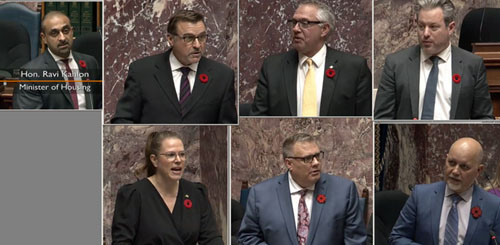
Private sector developers of course make a profit on building homes. That enables them to be active in the sector in order to build the next project.
ACC’s are to help municipalities cover the costs of obvious infrastructure requirements that new housing developments, neighbourhoods and communities will need and expect. That would include basics like sewer, water and greenspace as well as recreation centers and libraries, and facilities or services for seniors and youth.
Possible chilling effect on development:
Over the past couple of days, Opposition MLAs from BC United, BC Greens and BC Conservatives have made similar comments about how ACC’s will increase the cost of housing BC.
While opposition commentary is normal and expected, it might seem like a wakeup call for Minister Kahlon. Not the least of which will be a short-term chill on housing development (as municipalities and developers sort things out) while the housing crisis rages on (lack of supply and extraordinarily high prices for market housing and renting).
The BC NDP government legislation — coming in five parts — is intended to cover things like building more units on single family lots, building higher-density housing near transit hubs and frequent transit routes, and lowering the boom on short-term rentals as an investment business model.
It’s a lot all at once. But sometimes life is not comfortable. Sometimes a real crisis — like the shortage of housing supply — requires drastic action. Kahlon and above him Premier David Eby, seem unafraid to take on the challenge to build more homes as quickly as possible.
“We’re in a housing crisis and we must meet the moment,” said Kahlon in social media this evening. He says the BC government is acting to do the following, and that they “won’t let up speed”:
- Turn short-term rentals into homes
- Fund amenities with certainty
- Speed up permit approvals
- Fix outdated zoning rules
- Get more homes built near transit hubs
Political timing:
From a political perspective, due to a change in NDP premiers (Horgan did sadly fall ill, but installing a younger premier in Eby — with new vision — was part of the plan), the housing legislation seems to have been postponed from 2022 to late 2023.
Passage of the suite of housing legislation through the House, followed by regulation development with explanations to municipalities, the reality is that (other than the STR legislation which will kick in spring 2024) the new legislation impacting developers and municipalities won’t be really taking hold until late 2024 or early 2025 (due to a pause for the October 2024 provincial election).
To add cost and delay is the intention, says BC United shadow minister for Finance, Peter Milobar, which seems a bit extreme. Adding costs through tax policy is the other BC United stance, as well as ‘reducing housing purchase prices/rental by reducing the cost to build’. At one point, MLA Norm Letnick offered a positive suggestion that discounted or ‘free’ land be found from donors (like churches or community organizations), as one of the only ways to reduce the real costs of building new homes (especially the multi-family, high-density types).
Given the NDP majority government, the various pieces of legislation will get passed. Whether or not significant amendments will be made remains to be seen.
Load on municipalities:
The biggest load will be on municipalities, whose planning and permitting staff will have big workloads.
There will also be an onus on regular community residents to come forward at Official Community Plan (OCP) meetings to make contributions to a process that — if the current legislation passes — will give municipalities an open field to pretty much approve any housing project that comes along (which fits within the OCP). OCPs are much broader — a general vision — than specific bylaws and the details that might be sorted out in a permit approval process.
Municipalities might find the ACC’s attractive because it gives them relatively certain funds to build or manage the infrastructure that is needed along with more housing supply.
Some municipalities might enjoy the removal of the need for public hearings about property developments — it’s an onerous process with input at many times by people who come with biases or lack of information, when the developers know in most cases the project will proceed. Other municipalities will feel robbed of an opportunity to receive public input on projects… possibly because the weight of decision-making will land even more squarely on the shoulders of Mayor and Council in deciding whether any given project falls within the municipality’s current Official Community Plan (OCP).
Housing shadow minister:
In the House on November 9, BC United shadow minister for housing, Karin Kirkpatrick, said the suite of housing bills have been “hard to keep up with”, wondering why — say Bill 46 (ACC’s) and Bill 47 (housing along transit hubs) — weren’t combined into one.
She also put forth that few if any other ministers on the government side of the house have made in-session comments about positive aspects of the housing legislation that is likely destined to be approved.
Very likely the housing legislation is organized the way it is in order to achieve focus on particular aspects of tackling the housing crisis juggernaut, e.g. zoning for multi-unit, proximity to frequent transit, requirement for ACC’s — each of these has deep roots in details and regulations.
Comments from developers & municipalities:
Developers and municipalities are witnessing great changes in the industry, creating impacts at the project level in municipalities, through the suite of housing legislation being brought forward by the BC government. Some are excited, others have concerns.
There is likely a range of interest or support for the very real need to generate more housing supply in BC, quickly and efficiently.

- The District of Saanich seems clearly on board. Saanich Mayor Dean Murdock has made two in-person presentations alongside Minister Kahlon in recent weeks (one at Saanich Municipal Hall and one in the Hall of Honour at the BC Legislature).
- “I’m thrilled to hear the exciting news about the BC legislation that streamlines the delivery of homes, services, and infrastructure with upfront and clear Amenity Cost Charges (ACCs),” says developer Marcelo Corzo of LinkQuest Development. “Transparent costs and eliminating uncertainty will be game-changers for the industry,” she said, with reference to Bill 46. While there may be some challenges as different policies come into agreement across all municipalities, we look forward to the positive impact on our projects and the people we serve.”
- City of Langford Mayor Scott Goodmanson says his council and staff are taking time to review the literature in deeper detail before making a statement. However, he does say that “the announcement and new legislation coming is quite detailed and is going to have serious ramifications for communities across BC”.
- Town of View Royal council has released a letter requesting the BC Auditor General to commence a value-for-money audit on the proposed legislation — specifically to Bill 44 which will allow for multi-unit development on single-family lots; council is worried about impacts on residents (many of whom have homes on single-family lots). Town of View Royal Mayor Sid Tobias points out that the wording in the letter “may be familiar as it is similar to the request made by the opposition in Ontario for the Ontario Auditor General to investigate the Greenbelt Land Use change”. The November 7 letter was cc’d to every mayor and councillor in BC, indicating the potential broad impact of the new legislation across all communities in the province. Tobias points out that the province has not held public engagement around the new legislation, and that municipalities have been forbidden to hold public engagement — the concerns are around “accountability, transparency and protection of public interest”. View Royal will nonetheless be holding a Town Hall about the new legislation on Thursday November 23, 2023 from 6 to 8 pm, at Victoria Scottish Community Centre, 1803 Admirals Rd).
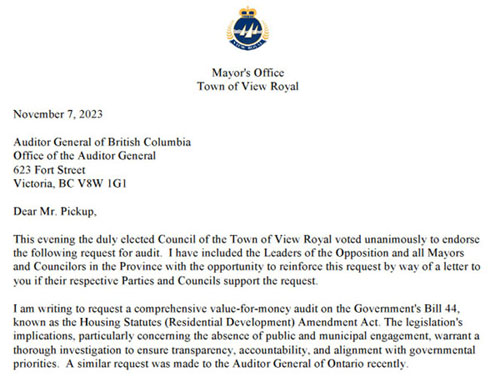
Generating further uncertainty:
Milobar says that if the BC United becomes the next majority government a lot of what might pass now for housing legislation will be reversed. If developers fear that, there could be now be an immediate chill on development that would last into 2025.
It’s possible that Minister Kahlon did not expect the level of negative push back that he’s getting on his suite of legislation. The series of roll outs with media coverage was upbeat and positive about addressing the very real need for more housing supply in BC.
Taking the bull by the horns:
It’s possible that in this case, the provincial government actually sees the dire need of keeping up with the need for more housing supply and — while realizing the impact on municipalities — knows how important it is to effectively pull out all the stops to catch up with housing supply in a real concrete way.
The ACC legislation in particular sees the need for a ‘whole community’ approach (beyond just supply), giving certainty to municipalities about funding for infrastructure (if the development community can comply).
Taking the bull by the horns is what majority governments are all about. When the results are positive, everyone wins. When the results create problems, it makes for messy political shifts and perhaps costs to communities (in this case around the basic need to have a place to call home).
“Whether it ends up working or not, you have to give (Premier Eby) credit for taking a big swing at a big problem,” said one political pundit in social media today. However, getting ‘A’ for effort is not enough when every household and community will be impacted possibly for generations. Kahlon seems to have the direction going right, and will probably be open to fine-tuning during the regulation phase.
===== RELATED:
- Smart combo: more housing near transit | comments by housing minister on OCP involvement (November 8, 2023)
- BC legislation to streamline delivery of homes, services, infrastructure (November 7, 2023)
- Hoped-for housing explosion based on multi-unit zoning (November 2, 2023)
- Clamping down on short-term rentals to free up housing stock (October 16, 2023)
- Housing the homeless: from encampments to permanence (October 12, 2023)
- BC housing initiatives announced twice this week (September 29, 2023)
===== ABOUT THE WRITER:
Island Social Trends Editor Mary P Brooke has been covering news of the BC government on a weekly basis since 2011, with a focus on the west shore 2014-2020 through West Shore Voice News, and since mid-2020 through Island Social Trends.
Ms Brooke reports with the BC Legislative Press Gallery. She was nominated in 2023 for a Jack Webster Foundation award that recognizes a woman journalist who contributes to her community through journalism.
This is independent journalism, funded by advertising, sponsorships, and premium subscribers. SUBSCRIBE | ADVERTISE
Watch for the print edition of Island Social Trends in 2024.



